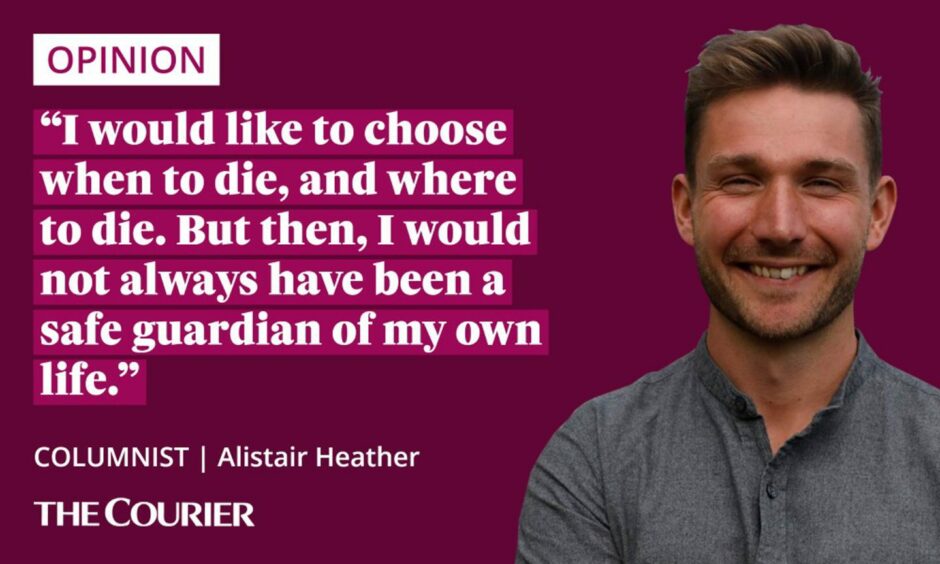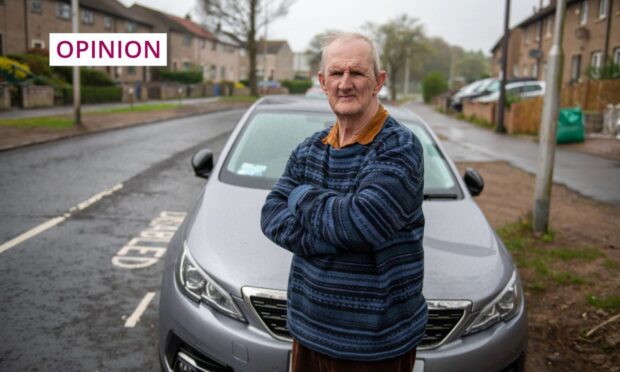In my day job in an MP’s office, I read lots of letters calling for a stout opposition to assisted dying. I see about the same again from those keen to push ahead with assisted dying in the UK.
As the TV adaptation of Andrew O’Hagan’s Mayflies novel brings the subject into our living rooms, it feels like this will be the next big debate we need to have.
Thanks to miraculous medical interventions, on things like cancer, flu, diabetes, heart disease, we are able to look forward to longer lives.
A hundred and fifty years ago, the average child born in Scotland could expect to live until they were 40. Now it’s around 80.
However, our poor old bodies and minds can really struggle to make the finish line.

So many of us face our ends with dementia, or experiencing some chronic health condition or disabling complication.
It’s a brutal end.
We sadly all know someone living in pain, or someone who has died with some cancer spreading to where doctors can’t reach it. It must be a fearful experience.
Should we, then, have a system of assisted dying to offer a safe and compassionate exit from all this?
What can we learn from Canadian model of assisted dying?
In Canada, the practice of medically assisted dying is well established.
At the moment, the main criteria you must fulfil is to be experiencing “unbearable physical or mental suffering from your illness, disease, disability or state of decline”.
The law remains controversial, but shows no sign of being meaningfully challenged or repealed.
The assistance in dying is mostly accessed by people in their 70s, many suffering from cancer and the vast majority already receiving palliative care.
It is a hastening of an already certain demise. A reduction of the term of the suffering, and a freedom to choose your own end.
End of life brought challenges to my family
I went for a walk recently to the grave marker of my grandparents, in the quiet Angus kirkyard of Panbride.
Both lived into their 90s. But my poor old granny had several chronic health conditions which made the decades of life I knew her in very difficult.
She would have severe coughing fits. Her heart required surgery. Her beautiful mind was afflicted by dementia, and she seemed frightened for many long nights and days in the care home.
The staff were loving, sympathetic. My grandad would visit often and hold her hand. My mum was there regularly.
But my granny – Myra was her name – suffered in her last years. As did those who cared for her.
In Canada, my granny could have signed a waiver, allowing her medical practitioner to supply her with a lethal dose of drugs when the doctor decided her condition had deteriorated enough.
#Mayflies was beautiful, heart goes out to anyone facing such a difficult decision. Dying people should not have to travel to 🇨🇭to have the death they want- or take matters into their own hands. We need excellent care and we need @Liam4Orkney assisted dying bill to pass. https://t.co/ZQbJXNrMOQ
— Ally Thomson (@allythomson01) December 27, 2022
I am nearly in tears even writing that.
I’m not sure I could bear the grief of medically assisted dying.
What if assisted dying had been an option when I considered suicide?
Canadians suffering from extreme mental ill health may soon be granted access to medical assistance in death.
I would like to choose when to die, and where to die. But then, I would not always have been a safe guardian of my own life.
I spent the middle third of my life dwelling on suicide.
I hated being alive. Utterly skint, undereducated, surplus to requirements and warped with mental ill health, I would pass whole days working in cafes in Dundee thinking about how and when to end things.
I’m glad I didn’t do it. Life has had far more joys in it than I could have ever expected.
I’ve learned to cope with my spiralling thoughts. I’m in love, and have hope for the future.
Therapy, mild medication and a group of loving friends got me through.
One good friend of mine works in the NHS. He is a devout Christian and he is opposed to assisted dying becoming law in the UK.
“People already have the right to refuse treatment,” he told me.
My pal is uncomfortable with the state becoming actively involved in death.
Leading experts involved in developing an expansion of Canada's medically assisted dying regime to people whose sole underlying condition is a mental disorder are at odds over whether the expansion should be delayed. https://t.co/egnr5rpTkc
— CTV News Calgary (@CTVCalgary) December 23, 2022
He thinks involving doctors and nurses actively in death will reduce trust in the profession.
He, and several big charity and faith groups, are worried that people with disabilities would feel pressured into thinking about assisted dying, to stop feeling like a burden on their families.
This is a debate that we all need to have
These are deep waters. Compassion must be foremost.
We know that our health service is struggling, and that mental health care is unavailable for the majority.
There is real fear that bringing in assisted dying would act as a pressure release valve for failing services, with those suffering choosing a speedy death rather than an uncertain and painful wait for care.
But what about those who face a certain end, in great pain, or are facing the terror of dementia?
What if there are medical professionals willing to assist their passing?
Who are we to deny them that option?
The volume of letters MPs are receiving on this, and the popularity of the Mayflies book and TV show, suggest we are just at the start of this discussion.
And it is a discussion which all of us need to have.
When life is difficult, Samaritans are there – day or night, 365 days a year. You can call them for free on 116 123, email them at jo@samaritans.org ,or visit samaritans.org to find your nearest branch.














Conversation